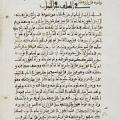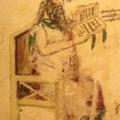148 - Fantasy Island: Ibn Bājja and Ibn Ṭufayl
Intellect and alienation in Ibn Bājja and Ibn Ṭufayl, author of the philosophical desert island castaway tale Ḥayy Ibn Yaqẓān.
Themes:
• Ibn Bājja, La conduite de l'isolé et deux autres épîtres, trans. C. Genequand (Paris: 2010).
• Ibn Ṭufayl, Ḥayy ibn Yaqẓān, trans. L.E. Goodman (New York: 1972).
• A. Altmann, “Ibn Bajja on Man’s Ultimate Felicity,” in Harry Austryn Wolfson Jubilee Volume, vol.1 (Jerusalem: 1965), 47-87.
• L.I. Conrad (ed.), The World of Ibn Ṭufayl: Interdisciplinary Perspectives on Ḥayy Ibn Yaqẓān (Leiden: 1996).
• D. Gutas, “Ibn Ṭufayl on Ibn Sīnā’s Eastern Philosophy”, Oriens 34 (1994), 224-41.
• T. Kukkonen, “No Man is an Island: Nature and Neo-Platonic Ethics in Ḥayy Ibn Yaqẓān,” Journal of the History of Philososophy 46 (2008), 187-204.
• T. Kukkonen, Ibn Tufayl: Living the Life of Reason (London: 2014).
• J. Puig Montada, “Philosophy in Andalusia”, in P. Adamson and R.C. Taylor (eds), The Cambridge Companion to Arabic Philosophy (Cambridge: 2005), 155-79.
• D. Wirmer, Vom Denken der Natur zur Natur des Denkens. Ibn Bāǧǧas Theorie der Potenz als Grundlegung der Psychologie (Berlin: 2014).

Andalusia


 ..
..



Comments
Excellent!
Excellent, as always, Peter. Quick question: is there an English translation of Ibn Bājja's, La conduite de l'isolé et deux autres épîtres? Thanks! Khalil
In reply to Excellent! by Khalil Habib
English translation of Ibn Bajja
Unfortunately no, there isn't, at least not one I'm aware of (would be interested to hear if anyone knows better!).
In reply to English translation of Ibn Bajja by Peter Adamson
Translations of Ibn Bajja
Not sure if there's a complete translation, but the Lerner and Mahdi volume Medieval Political Philosophy has some text(s) by Ibn Bajja.
In reply to Translations of Ibn Bajja by Ibn Yaqzan
Ibn Bajja translation
Oh that's right, yes: it has excerpts from the Governance of the Solitary on pp.123-33. It is pretty selective though.
In reply to Ibn Bajja translation by Peter Adamson
Yes, I found it, thank you.
Yes, I found it, thank you. Very abridged, but better than nothing.
In reply to Excellent! by Khalil Habib
Here you
Here you go:)
http://www.scribd.com/doc/8740631/Ibn-Bajjas-Regimen-of-the-Solitary
In reply to Here you by Avi Solomon
Ibn Bajja
Good grief! That's pretty handy, thanks. Who is this translation by?
Animal Ethics
Dear Peter,
I think Ikhwan Safa' too, discuss animal ethics in great detail.
In reply to Animal Ethics by philosophos
Animals
Indeed - they have a treatise that imagines a debate between humans and animals about how animals are treated. I think I mention it in episode 135. I actually have a forthcoming article on animal ethics in Razi, the Ikhwan and Ibn Tufayl. Will announce when it's out.
Scheinanglizismus
Peter, you've been in Germany too long ... you said "Happy End" around the 2-minute mark instead of "happy ending." :-)
But I enjoyed hearing this lecture, both for the philosophical content and because it brought back memories of my intensive Arabic study in Damascus in summer 2008, where I read excerpts from Hayy b. Yaqdhan with my tutor.
In reply to Scheinanglizismus by Nicholas Marinides
Happy end(ing)
Good grief, I am only a year here, and already have I my native language forgotten!
Is Ḥayy ibn Yaqẓān the first novel in Arabic?
Peter,
I have been listening to your podcasts in order since early last summer, having breakfast to one episode most mornings, and am now up to the Mongol Era, so very nearly caught up. Thank you very much for this clear, lacuna-free history of philosophy. I did an undergraduate degree in the subject, and the extent of my education in the Arabic philosophical tradition was a single hour-long lecture that summarized the political views of Avicenna, Averroes and The Rambam (apparently such philosophers only deserve 20 minutes each!). This was enough to intrigue me and it is wonderful to get a more even-handed take on this rich tradition without the blinkers or alarmist polemics of eurocentrism.
My question, as the subject implies, is about Ḥayy ibn Yaqẓān. I was particulary intrigued when you mentioned that this was likely the basis for Robinson Crusoe (a proto-colonial tale that I find repugnant but fascinating), and upon checking Wikipedia today (I know, I know), I saw that it is listed as the first Arabic novel. First of all, I know you're not a scholar of literature, but do you think this is a fair characterization? Because I don't remember you mentioning this little tidbit in your episode. Second, if it is true, while I recognize that this is a series on philosophy, I think it would be great if you could expand just a little bit upon the literary significance of the works under discussion, especially if it is as groundbreaking as "first novel in a major world language." As a novelist, I am particularly interested, but I suspect other listeners would be as well.
Sorry for the long post. I'll try to keep them concise now that I've introduced myself.
I'm looking forward to reading Ḥayy ibn Yaqẓān now that you've kindly introduced me to it and hearing you one day talk about Dennet, Charles Tayler and Zizek.
In reply to Is Ḥayy ibn Yaqẓān the first novel in Arabic? by Eli K.P. William
A novel novel?
Thanks, that's an interesting question. I guess it may depend on what counts as a "novel" but I think the novelty (so to speak!) of Hayy is more the use of the fictional form to do philosophy, than the idea of a prose narrative following a character. See for a nice collection of Arabic literature (some of it basically "fiction" and earlier than Ibn Tufayl) this book edited by Van Gelder.
In reply to A novel novel? by Peter Adamson
Thanks
Thanks for take on the question. Looks like a fascinating book!
Add new comment